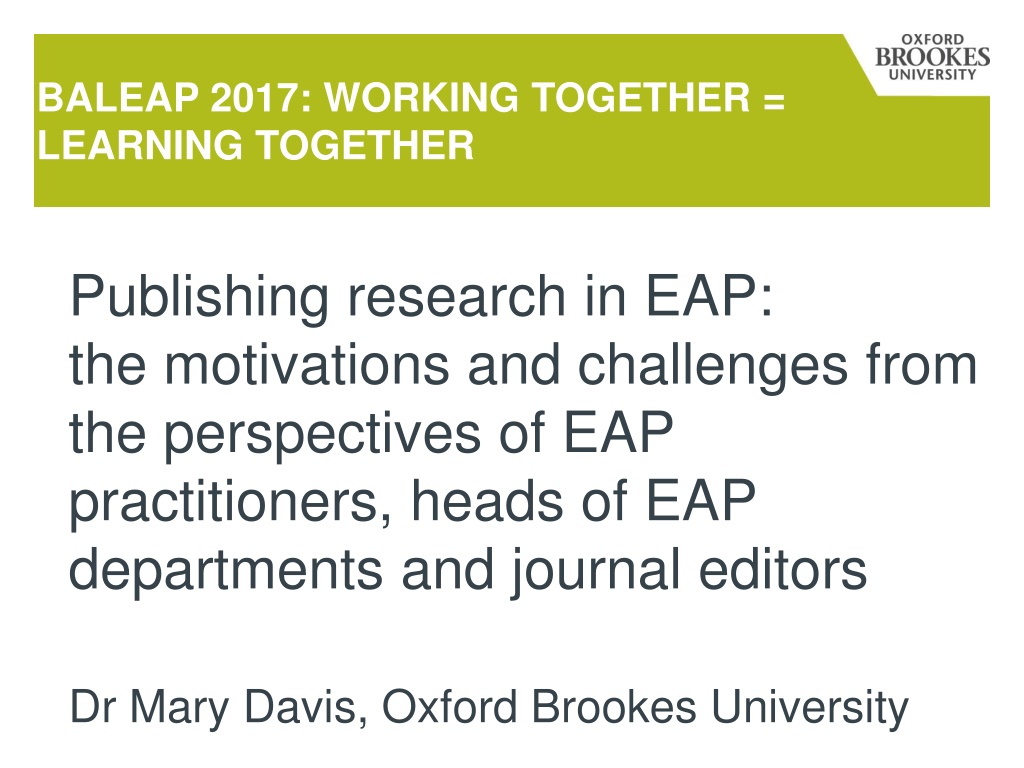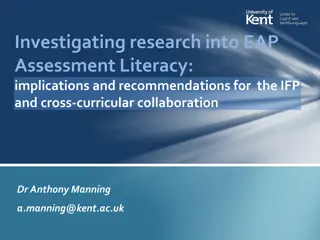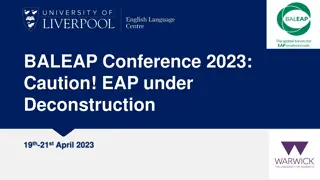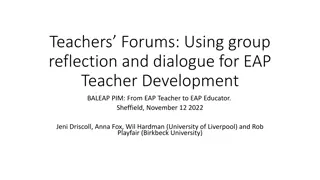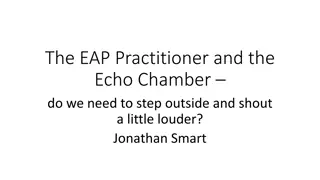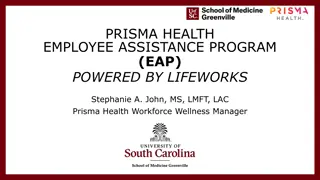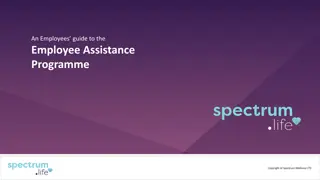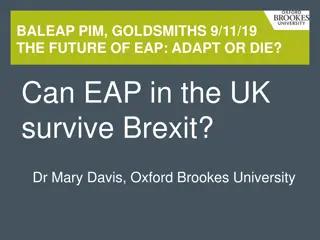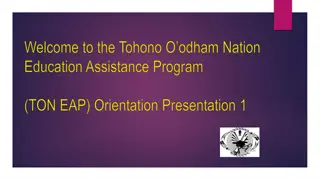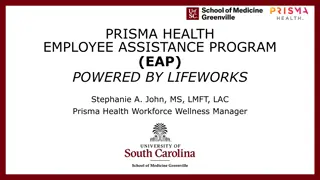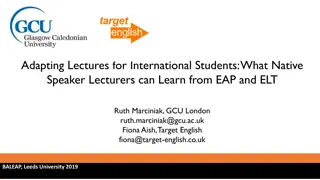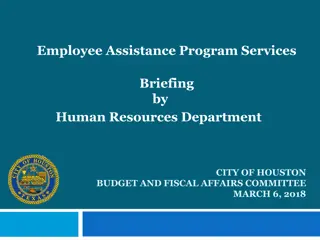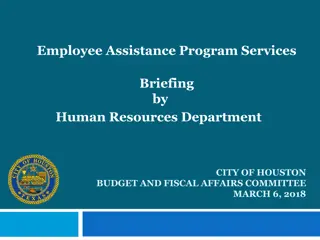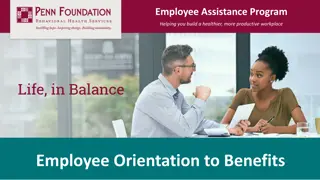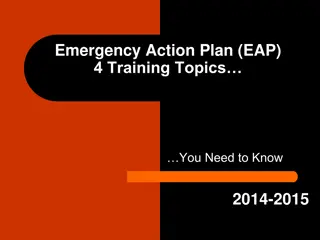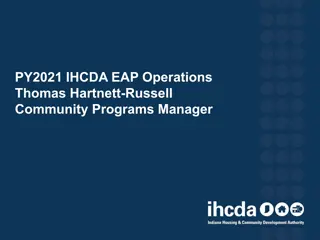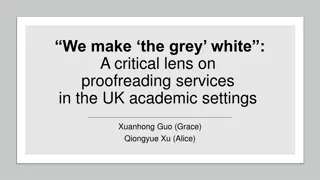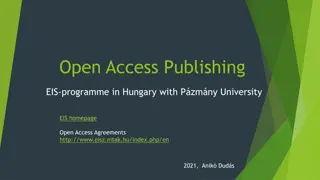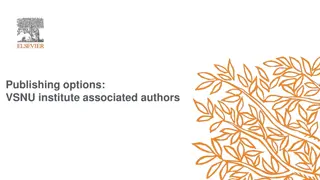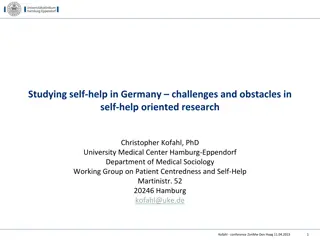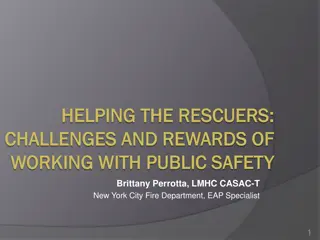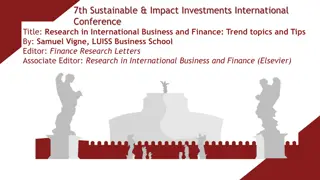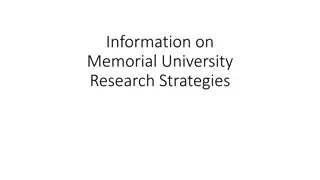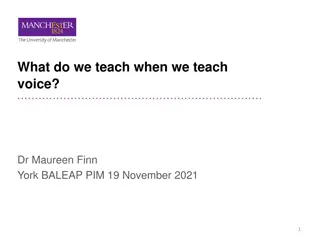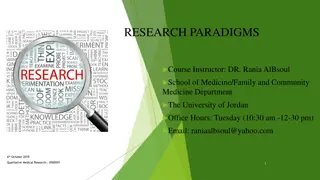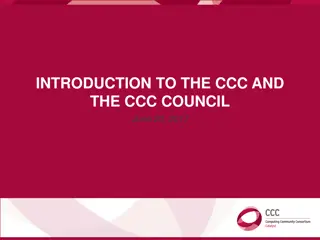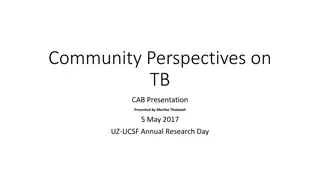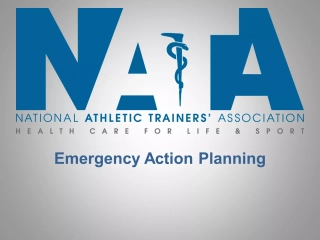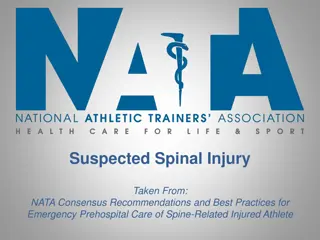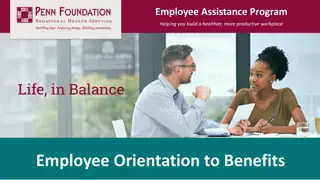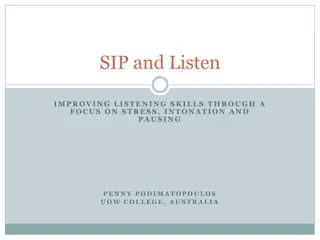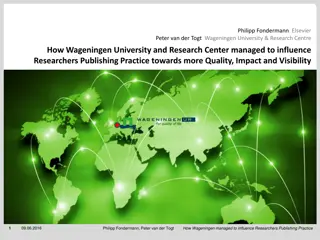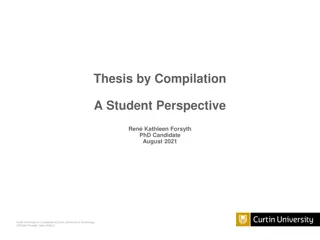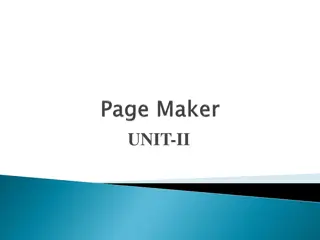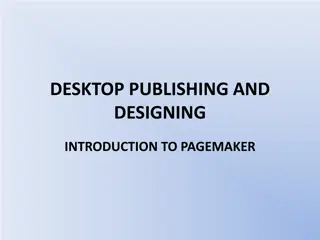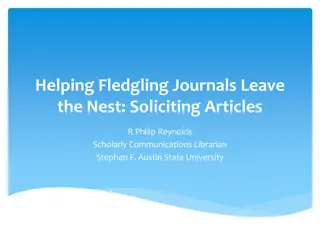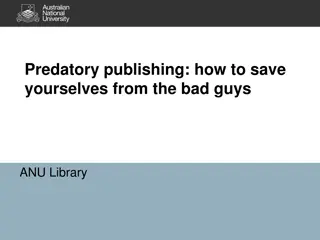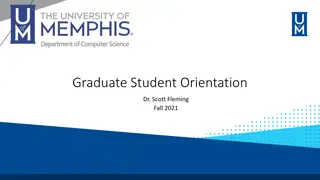Insights into Research Publishing in EAP Community
Delve into the motivations and challenges faced by EAP practitioners, heads of EAP departments, and journal editors when it comes to publishing research. Explore the impact of engaging in research on classroom teaching practices, the significance of writing in EAP, and the credibility and authority associated with actively participating in academic activities.
Download Presentation

Please find below an Image/Link to download the presentation.
The content on the website is provided AS IS for your information and personal use only. It may not be sold, licensed, or shared on other websites without obtaining consent from the author. Download presentation by click this link. If you encounter any issues during the download, it is possible that the publisher has removed the file from their server.
E N D
Presentation Transcript
BALEAP 2017: WORKING TOGETHER = LEARNING TOGETHER Publishing research in EAP: the motivations and challenges from the perspectives of EAP practitioners, heads of EAP departments and journal editors Dr Mary Davis, Oxford Brookes University
JOHN SWALES I still remain puzzled at how few BALEAP folks actually publish in the accredited journals. BALEAP itself, and its PIMS etc is extremely lively and interesting, but somehow its enthusiasts do not seem to pass the final hurdle into publishing recognition. So, I am hoping you can shed light on this issue.
DATA COLLECTION Interviews - 9 EAP practitioners Survey 30 Heads of EAP Departments Email survey 7 journal editors
EAP PRACTITIONERS No. Years of EAP 18 PhD EAP Publications 1 Completed JoAW 2 8 About to start ESPJ, InForm 3 18 - ISEJ 4 30 - InForm, BALEAP Conf Pro, EAL, books, others System, CSEDU 5 30 Began 6 7 About to finish JSIE 7 15 Completed BALEAP Conf Pro, EATAW Conf Pro 8 20 Completed ELTJ, BALEAP Conf Pro, books, others 9 25 Completed ELTJ, JSLW, BALEAP Conf Pro, books, others
FEEDS INTO TEACHING P5. As soon as I start engaging in a piece of research, my classroom practice comes alive because I am directly linking reflections on issues with my teaching practice. So every time I do some research, it really has a profound impact on my practice, and I like that, just to think, why are you doing this? Oxford Brookes University Digital Asset Bank
NEED TO WRITE TO TEACH WRITING P1. I think that people need to write because that is one of the things that EAP is about, And if you don t write yourself, I just wonder on what grounds you can offer advice to others P4 I cannot imagine being able to helpa Master s student with his or her research and writing up of a dissertation, if you haven t done any writing recently yourself.
CREDIBILITY AND AUTHORITY P5 Especially working on in-sessional with doctoral students, how can anyone have any credibilitywith their colleagues, unless they are seen to be doing something? P9 I think fundamentally as an EAP professional, you are teaching students to write, to make presentations, do research, and if you don t engage yourself in those things, you don t have much authority to do that. I think staff can perform better if they are engaged themselves in the academic process
RAISE PROFILE, GET PROMOTION P2 We need to try to raise our profile as serious members of the academic community, rather than support staff with no academic credentials at all P3 If you ever want any kind of promotion or recognition, you need to publish in university, otherwise you really do feel like the Cinderella of the university world. Clip art Cinderella
DEFEND EAP, GET PROFESSIONAL STANDING P7 in terms of defending EAP s status as academic, it is absolutely vital.. to try to combat this Noddy perception of us, this idea of us as not academic. Clip art Noddy P9 we are in the university environment, and if you don t have any publications or conference papers, it does not say very much about your professional standing. You want to appear worthy to your peers
TIME P5 All of my research has been done in my spare time because it has never been an official part of my job, but that is bonkers P8 I have no official research time, staff development time or scholarship time, but I make my own time, I do it in spite of my workload P9 Major journals ESPJ, JEAP, they tend to be interested in major pieces of empirical research, for us as EAP practitioners, it s difficult to produce that volume of work, we don t have the time. Clip art clock
NO WORKING TIME P6 All EAP professionals would like to say we are a profession, but you are not encouraged, once you get to a certain point, to take it any further. I find that contradictory really. They say it isn t your job to research, it isn t what your job s involved in, this isn t what you re employed to do. In my workplace, every year, staff are encouraged to put in a bid for a project, I said look, I am doing this project, will you give me some hours for that, one or two hours a week, and the answer was very clearly absolutely not, this does not benefit the ELC so you re not getting any time for that
YEAR ROUND TEACHING P2 The vast majority of people in this profession focus on the teaching, the marking, and everything else connected with it, and the thing that has to slip is the research - the year round nature of EAP has a lot to do with it P7 The main challenge is not having enough time because of teaching, we teach more weeks of the year. Now I am part-time, that is making it easier for me to find the time to read and write and get something that I hope will be of publishable standard Bob Pomfret, Oxford Brookes University RADAR
LACK OF PUBLISHING CULTURE P2 There is a lack of publishing culture within the profession. There are a few people who do publish, but when you look at the big names in EAP, they are generally lecturers in TESOL or SLA or something. The publishing culture seems to move away from the chalk face of what we actually do. When I have been to BALEAP events, there does seem a particular way of presenting research which is very often this is the idea we had, this is what we did and here is some student feedback saying they liked it very much which isn t publishable
LACK OF MENTOR P9 we don t have someone who could mentor. I think in most academic departments, there are mentors to help people, younger academics, so they nurture this kind of work, but we don t seem to have that. P8 there is a lack of mentoring Oxford Brookes University Digital Asset Bank
NETWORKING AND COLLABORATING P3 It s very hard to find a network of people to work with, and I think that would make a difference to carrying out research and getting published. P9 The best kind of help can be at conferences, meeting people, editors of journals, other researchers who publish, talking to them, I think that s very important P4 Collaborating is very helpful Oxford Brookes University Digital Asset Bank
WHICH JOURNAL? P3 I sent it off to the ELTJ and they wrote back and said yes this is very interesting, very nice but it s not about English, not about the nitty-gritty of teaching English, we don t want it. So I then sent it off to Language Learning Technology which might have been aiming too high, because it has got a good reputation, and they said oh no, this isn t rigorous enough, you haven t controlled the variables, we don t want it, so I m going back to scratch and thinking where am I going to publish it, it doesn t seem to fit into any particular pigeonhole.
VIEWS OF JOURNALS P1 one is more likely to get accepted in a new journal, than one that has a long history P4 I ve never tried to submit to a journal I didn t think would accept, I ve never tried to submit to JEAP for example Clip art journals
GOOD FEEDBACK P5 We had the most fantastic feedback from the reviewers they were both incredibly helpful not only helped with the article, but contained a plan for the next 2 or 3 articles. I felt there was somebody out there who really understood what we were trying to achieve, they were so engaged, they helped shape what we were doing and I was very grateful to that person. P8 Editors have been supportive I have had lots of rejections but no terrible comments.
MANAGERS DO NOT HELP P2 My line manager is the interim head of the ELC and she doesn t publish or do research, so she wouldn t be able to help me. P7 I don t feel that our line manager has been very helpful. I think we ve not been given sufficient professional development. Currently our line manager is an interim after our head of department s retirement. They see us as teaching staff only. P4 You need to be in a context that believes in research. Being with student services and things like that isn t conducive to research and publication.
MANAGERS ARE JEALOUS P8 Once a manager tried to pull the plug out of my computer! I have encountered jealousy from certain managers, and have the feeling that management is sometimes unhappy about efforts to publish because it might undermine their authority, some people can be paranoid. Let s face it, if you re a manager and people you manage are more intelligent and academically active than you are, there s a threat and rivalry, augmented by research, so they may say well done but wish they could do it. Clip art jealousy
UNHELPFUL, HOSTILE WORKPLACE P5 I get better support from the HEA, than any EAP unit I have worked in. My unit did not want me to publish anything. They threw as many bricks in the way as they could. P6 Just trying to get any kind of recognition from my department is a real problem. I think having Language Centres that aren t considered to be academic, there is certainly an implication that you should not be engaged in research
SURVEY OF HEADS OF EAP DEPTS Have you published any research in EAP? How many staff teach EAP in your department? How many members of EAP teaching staff in your department do the following: a)Carry out research b)present at conferences c)publish research How important do you think it is for EAP teaching staff to publish research in EAP? a)Very important b)important c)not important Please explain the reason for your view in question 4.
Q1: HAVE YOU PUBLISHED ANY RESEARCH IN EAP? Answered: 30 Skipped: 0
Q2: HOW MANY STAFF TEACH EAP IN YOUR DEPARTMENT? Answered: 28 Skipped: 2
EAP STAFF RESEARCH ACTIVITIES 12 10 8 6 Carry out research 4 Present at conferences 2 Publish research 0 None 1 to 2 3 to 5 6 to 9 10 or more
IMPORTANCE OF EAP PRACTITIONERS PUBLISHING Importance of publishing research in EAP 37 7 Not important Important Very important 20
REASONS WHY IMPORTANT HOD1 I feel very strongly that EAP is an academic subject. In order for us not to be perceived as a "service", we need to be active in both "scholarly" and "research" activity as academic colleagues in other disciplines are. HOD2 I think it is very important for EAP teaching staff to carry out research and to publish it - one can take informed decisions, when setting up or updating courses, with regards to teaching and learning methods, designing materials, student needs, etc. HOD3 Recently all staff have moved across to teaching only contracts and so research is not required, however, some staff still do research in their own time.
JOURNAL EDITORS JEAP, ESPJ, JSLW, JoAW, System, InForm, ELTJ Where do submissions to your journal tend to come from, in terms of the author s base and professional role? Do you see any specific challenges for EAP practitioners to publish research in your journal? Do you have any advice to EAP practitioners who wish to publish research in your journal?
ADVICE FROM JOURNAL EDITORS E1. Read a lot of research; get to know the journal and its expectations; research and publish with someone who has done both before and can show you the way. E2. Have a solid rigorous research design E3. Identify something that readers in other contexts could utilize
